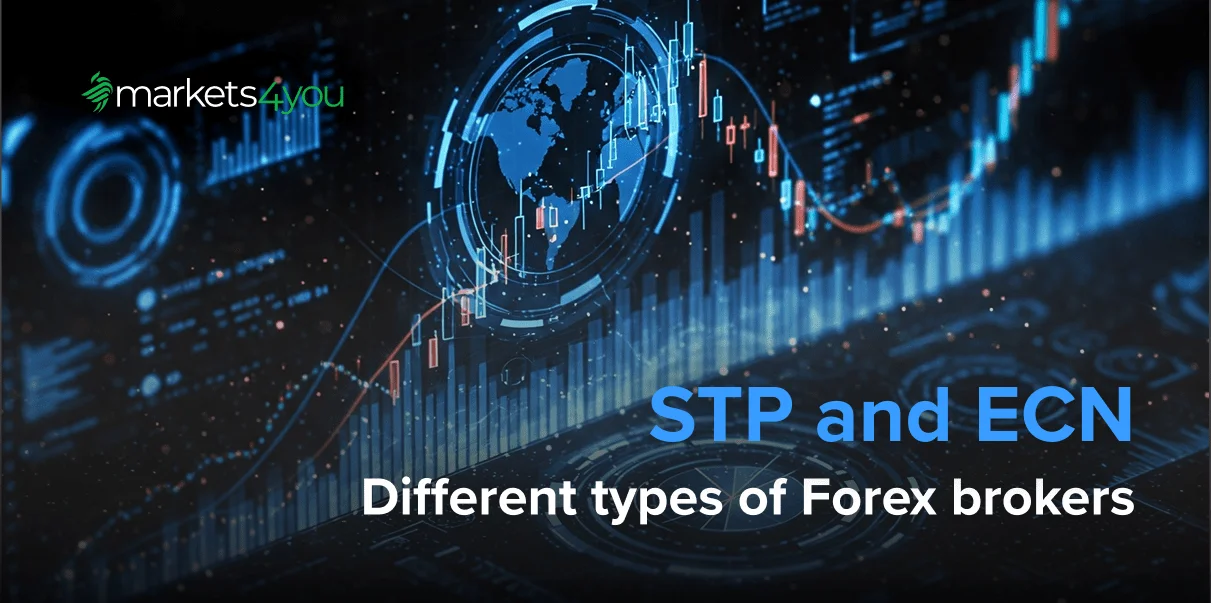STP and ECN: Different Types of Forex Brokers

Following our understanding of Dealing Desk and Non-Dealing Desk (NDD) brokers, we now explore two significant variants within the NDD category: Straight Through Processing (STP) and Electronic Communications Network (ECN) brokers.
These forex broker types offer distinct advantages and characteristics that cater to different trading styles and needs.
Understanding STP Brokers
Straight Through Processing (STP) brokers represent a sophisticated approach to forex trading execution. These brokers route client orders directly to their liquidity providers who have access to the interbank market.
The key distinction of STP trading lies in its automated nature – from order placement to closure, the entire process occurs without manual broker intervention.
STP brokers have gained popularity among traders who seek direct market access. Their system offers volatile price quotes, making them particularly suitable for scalping strategies.
Traders can execute trades directly from the interbank market, benefiting from the best available bid and ask quotes. One of the most attractive features of STP brokers is their ability to offer extremely tight spreads, which can sometimes reach zero.
However, traders should be aware that STP platforms often present a steeper learning curve. These trading platforms are typically more complex and weren’t originally designed with retail traders in mind. This complexity represents the main drawback of choosing an STP broker.
ECN Brokers: A Network of Market Participants
Electronic Communications Network (ECN) brokers operate on a different principle, creating a network where various market participants can interact and trade directly with each other. This network includes banks, retail traders, hedge funds, and other brokers, all competing by offering their best bid and ask prices.
One of the distinguishing features of ECN brokers is their commitment to market transparency through the Depth of Market (DOM) feature. This powerful tool provides traders with visibility into other market participants’ buy and sell orders, offering valuable insights into market dynamics.
All transactions process directly on the interbank market in No Dealing Desk mode, with brokers typically earning through small commissions on traded volume rather than spread markups.
Trading with an ECN broker offers several compelling advantages. Traders gain direct access to the interbank market for real-time trading opportunities and can execute trades using the best available bid and ask quotes.
Like STP brokers, ECN platforms can offer extremely tight spreads that occasionally reach zero. However, ECN trading comes with its own set of challenges.
The platforms tend to be complex, as they weren’t initially designed for retail traders. Additionally, these platforms often offer limited trading signals and tools compared to more retail-focused brokers. Traders must also factor in the commission charges that typically apply to every trade.
Understanding Execution Types: Market vs. Instant
These different broker types employ distinct execution methods that significantly impact trading experiences. STP and ECN brokers typically use market execution, while dealing desk brokers often utilize instant execution.
Market execution, common among STP and ECN brokers, fills orders at the best available market price. This method guarantees execution but may result in slippage, as you might not receive exactly the price you requested.
Traders can set Stop-Loss and Take-Profit levels when entering positions, and the price comes directly from the market. This execution type particularly suits traders focusing on higher timeframes where minor price differences have less impact.
Instant execution, typically used by dealing desk brokers, promises execution at the exact displayed price. If the requested price becomes unavailable, you’ll receive a requote rather than automatic execution at the next available price. While this ensures price certainty, it may result in rejected orders or delays during volatile market conditions.
Choosing the Right Broker Type
Selecting between STP and ECN brokers depends largely on your trading style, experience level, and specific needs. Consider these factors when making your choice:
- For STP Brokers: Choose this option if you value automated order processing and are comfortable with more complex trading platforms. This type suits traders who employ scalping strategies and can handle price volatility.
- For ECN Brokers: Consider this option if you want direct interaction with other market participants and value transparency through depth of market information. This suits traders who prioritize tight spreads and don’t mind paying commissions for better execution.
Conclusion
Both STP and ECN brokers offer sophisticated trading solutions for forex traders seeking direct market access. While they share some common advantages like tight spreads and market connectivity, each type has unique characteristics that may better suit different trading styles.
Understanding these differences helps ensure you choose the broker type that best aligns with your trading strategy and goals.

